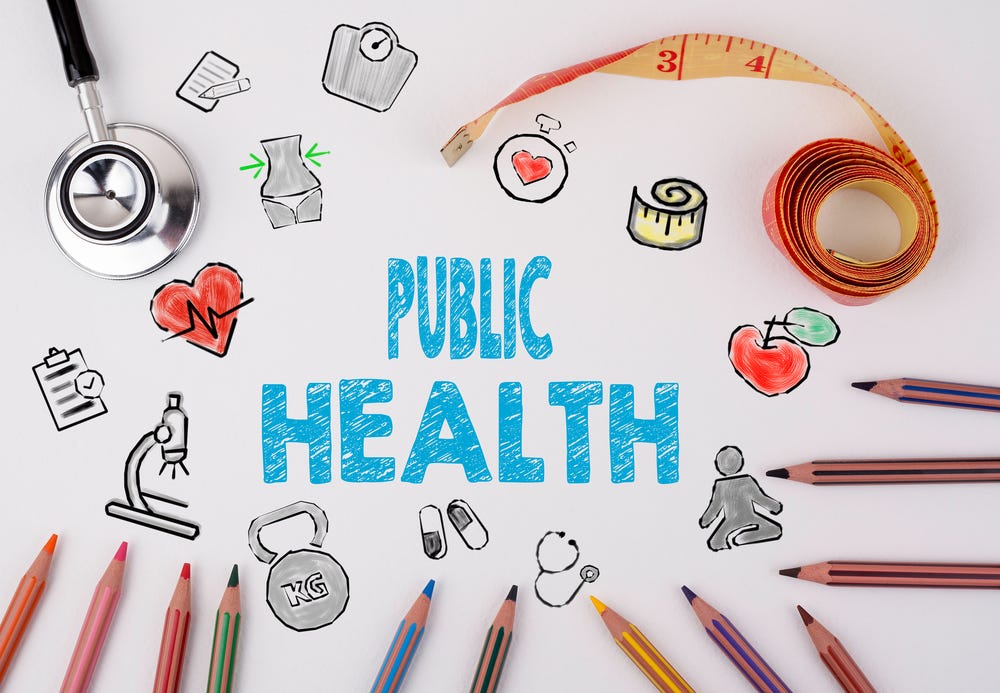E-Pluribus | July 15, 2022
Pronouns take another hit, the decline of public health agencies, and going below the surface on America's problems.
A round-up of the latest and best writing and musings on the rise of illiberalism in the public discourse:
Fareed Zakaria: Forget pronouns. Democrats need to become the party of building things.
There is a growing realization on the left that villainizing Donald Trump alone will not save them. While the cultural divide is real, political parties must deliver on a practical level for voters. Fareed Zakaria courts the wrath of the gender identity movement in his latest for the Washington Post where he argues that identity issues need to take a back seat to issues that reach more voters where they live.
Republicans [ . . . ] believe they have found a deep vulnerability among Democrats. A recent, comprehensive New York Times poll seemed to confirm this view. Analyzing some of the findings of the poll, David Leonhardt wrote, “Many Democrats — both politicians and voters, especially on the party’s left flank … seem more focused on divisive cultural issues than on most Americans’ everyday concerns, like inflation.” To be fair, President Biden still beats Trump in a head-to-head matchup, but that dynamic might not help the Democrats in the midterm elections, when Trump is not on the ballot.
There is plenty of evidence that the Democratic Party has moved left, that it is out of sync with Americans on many of these cultural issues, and that it needs to correct course. But it needs to do so clearly, forcefully and repeatedly. Republicans are clever at weaponizing the words of a few left-wing Democrats and branding them as the face of the party. For example, I have not found a single senior national Democratic leader who has ever endorsed the idea of “defunding the police” — Biden actually proposed increased funding for cops — and yet Republicans have repeated this mantra constantly.
[ . . . ]
Yet Democrats have another big weak spot, and it centers on performance. Democrats in power often seem unable to get anything done… Why is the Biden administration not announcing large new public works projects every week, financed by the federal funds appropriated in those two bills?
The answer is that it has become very difficult to build anything in America, especially in blue states. President Barack Obama, who passed another big infrastructure bill in 2009, famously said later that “there’s no such thing as shovel-ready projects.” That’s because, as New York Times columnist Ezra Klein has noted, the number of permits, reviews, and delays that have become part of the normal approval process have delayed or doomed the prospects of large-scale public projects. Democrats have become paralyzed by their own ideas and interest groups, and no one seems able to break through and actually get things done.
Read it all here.
Marty Makary M.D., M.P.H. and Tracy Beth Høeg M.D., Ph.D.: U.S. Public Health Agencies Aren't ‘Following the Science,’ Officials Say
At Bari Weiss’s Substack Common Sense, two doctors are saying out loud what many others appear to timid to say: the FDA and CDC have become hopelessly politicized. Marty Makary and Tracy Beth Høeg write that, although the pandemic response has highlighted the problem, the effects are likely to go deeper as the reputations of public health agencies continue to decline.
At the NIH, doctors and scientists complain to us about low morale and lower staffing: The NIH’s Vaccine Research Center has had many of its senior scientists leave over the last year, including the director, deputy director and chief medical officer. “They have no leadership right now. Suddenly there’s an enormous number of jobs opening up at the highest level positions,” one NIH scientist told us. (The people who spoke to us would only agree to be quoted anonymously, citing fear of professional repercussions.)
The CDC has experienced a similar exodus. “There’s been a large amount of turnover. Morale is low,” one high level official at the CDC told us. “Things have become so political, so what are we there for?” Another CDC scientist told us: “I used to be proud to tell people I work at the CDC. Now I’m embarrassed.”
Why are they embarrassed? In short, bad science.
[ . . . ]
It is statistically impossible for everyone who works inside of our health agencies to have 100% agreement about such a new and knotty subject. The fact that there is no public dissent or debate can only be explained by the fact that they are—or at least feel that they are—being muzzled.
It is an ancient, moral requirement of our profession to speak up when we believe questionable treatments are being proposed. It is also good for the public. Imagine, for example, a world in which those scientists who suggested that masking for children and school lockdowns were worse for public health were not smeared but instead debated?
The official public health response to Covid has undermined the public's belief in public health itself. This is a terrible outcome with potentially disastrous consequences. For one thing, because of these sloppy and politicized policies, we run the risk of parents rejecting routine vaccines for their children—ones we know are safe, effective and life-saving.
Read the whole thing.
Tanner Greer: Our Problems Aren’t Procedural
Jonathan Haidt‘s April essay in The Atlantic faulted social media for much of what ails America these days. Tanner Greer writes for City Journal that we must go deeper to truly recognize the issues dividing the country. While how we communicate cannot be overlooked, the substance of what is being said (on both sides) is far more significant.
[G]enerational disconnect points to a plausible alternative mechanism for the radical edge that began taking hold in the 2010s. Sociologists have shown that the events of one’s youth are truly formative. The ideas, attitudes, and social pressures of one’s teenage and early adult years have a decisive impact on one’s worldview and political attitudes, even after the conditions that created these pressures have long disappeared. After hitting his mid-twenties, the political, social, and religious attitudes of the average American citizen are mostly locked in place. Generational churn is thus the engine of social revolution. Cultures do not change when people replace old ideas with new ones; they change when people with new ideas replace the people with old ones.
Often, as is the case with woke ideology, the ideas in question are themselves quite old. Their conquest thus appears both gradual and sudden. Beneath the official comings and goings of generational cohorts above, insurgent ideas and attitudes gradually take hold in the cohorts below. The importance of this revolution in ideas is initially obscured by the inability and inexperience of youth. But the youth do not stay young—eventually, a transition point arrives. Sometimes, this transition will be marked by a great event that old orthodoxies cannot explain. Other times, it is simply a matter of numbers. In either case, the older cohorts suddenly find themselves outnumbered and outgunned, swept away by a flood of ideas that they had assumed were an insignificant trickle.
[ . . . ]
If cancel culture has always been with us, what has changed over time is what an American can be cancelled for. Twenty years ago, country music bands were being cancelled for opposing the Iraq War and writers were being cancelled for refusing to put American flags on their doorstep. Today, a different set of offenses leads to ostracization, but the forms and consequences of ostracization are largely the same. The current moment feels so fraught not because cancellation has emerged as a new feature in American life but because of the sudden and dramatic shift in the range of views deemed cancel-worthy. For the first time in their lives, many Americans find themselves on the wrong side of Tocqueville’s circle. This shift is especially disorienting for centrists whose views had—for most of their lives—constituted the very definition of acceptable opinion.
Procedural reforms to social media will not reverse this shift. “Extremists” fill universities, law firms, corporate offices, consultancies, upper-class social circles, media organizations, and both political parties. It is not Facebook that tilts Fox News to the Trumpist right; and the war for the Gray Lady’s future is waged on Slack, not on Twitter. The central questions in American life do not revolve around the size of the radicals’ microphone but the substance of what the radicals are saying—and, one hopes, on the substance of what might be said to rebut them.
Read it all.
Around Twitter
A few excerpts from a Tablet Magazine article “Who Really Benefits From the First Amendment?” via K.C. Johnson, Karol Markowicz, and James Kirchick:
And finally, when you’ve lost Ruy Teixeira…











